Linchpin: Are You Indispensable? – Seth Godin
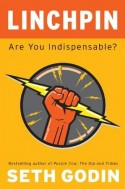 There used to be two teams in every workplace: management and labor. Now there’s a third team, the linchpins. These people invent, lead (regardless of title), connect others, make things happen, and create order out of chaos. They figure out what to do when there’s no rule book. They delight and challenge their customers and peers. They love their work, pour their best selves into it, and turn each day into a kind of art.
There used to be two teams in every workplace: management and labor. Now there’s a third team, the linchpins. These people invent, lead (regardless of title), connect others, make things happen, and create order out of chaos. They figure out what to do when there’s no rule book. They delight and challenge their customers and peers. They love their work, pour their best selves into it, and turn each day into a kind of art.
Linchpins are the essential building blocks of great organizations. Like the small piece of hardware that keeps a wheel from falling off its axle, they may not be famous but they’re indispensable. And in today’s world, they get the best jobs and the most freedom. Have you ever found a shortcut that others missed? Seen a new way to resolve a conflict? Made a connection with someone others couldn’t reach? Even once? Then you have what it takes to become indispensable, by overcoming the resistance that holds people back.
Delivering Happiness: A Path to Profits, Passion, and Purpose – Tony Hsieh
 * Pay brand-new employees $2,000 to quit
* Pay brand-new employees $2,000 to quit
* Make customer service the responsibility of the entire company-not just a department
* Focus on company culture as the #1 priority
* Apply research from the science of happiness to running a business
* Help employees grow-both personally and professionally
* Seek to change the world
*Oh, and make money too . . .
Sound crazy? It’s all standard operating procedure at Zappos, the online retailer that’s doing over $1 billion in gross merchandise sales annually. After debuting as the highest-ranking newcomer in Fortune magazine’s annual “Best Companies to Work For” list in 2009, Zappos was acquired by Amazon in a deal valued at over $1.2 billion on the day of closing.
In DELIVERING HAPPINESS, Zappos CEO Tony Hsieh shares the different lessons he has learned in business and life, from starting a worm farm to running a pizza business, through LinkExchange, Zappos, and more. Fast-paced and down-to-earth, DELIVERING HAPPINESS shows how a very different kind of corporate culture is a powerful model for achieving success-and how by concentrating on the happiness of those around you, you can dramatically increase your own.
Rework – Jason Fried & David Heinemeier Hansson
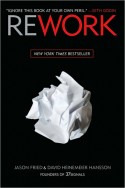 Most business books give you the same old advice: Write a business plan, study the competition, seek investors, yadda yadda. If you’re looking for a book like that, put this one back on the shelf.
Most business books give you the same old advice: Write a business plan, study the competition, seek investors, yadda yadda. If you’re looking for a book like that, put this one back on the shelf.
Rework shows you a better, faster, easier way to succeed in business. Read it and you’ll know why plans are actually harmful, why you don’t need outside investors, and why you’re better off ignoring the competition. The truth is, you need less than you think. You don’t need to be a workaholic. You don’t need to staff up. You don’t need to waste time on paperwork or meetings. You don’t even need an office. Those are all just excuses.
What you really need to do is stop talking and start working. This book shows you the way. You’ll learn how to be more productive, how to get exposure without breaking the bank, and tons more counterintuitive ideas that will inspire and provoke you.
With its straightforward language and easy-is-better approach, Rework is the perfect playbook for anyone who’s ever dreamed of doing it on their own. Hardcore entrepreneurs, small-business owners, people stuck in day jobs they hate, victims of “downsizing,” and artists who don’t want to starve anymore will all find valuable guidance in these pages.
Never Get a “Real” Job: How to Dump Your Boss, Build a Business and Not Go Broke – Scott Gerber

A twenty-something hustler, rainmaker, and bootstrapper who has survived and thrived despite never having held the proverbial “real” job, Scott Gerber is the ultimate “Generation Y-er.” He’s a self-taught serial entrepreneur who built several successful businesses without storied business connections, a business school background, executive training—or investment dollars. And in Never Get a “Real” Job, he shows you how he succeeded so you can overcome today’s chronic conditions of mass unemployment, underemployment, and dead-end 9-to-5s.
Gerber gives you the no-bull reality on turning your business idea into a viable enterprise capable ofgenerating real income now—based on his hard-knocks lessons learned in the entrepreneurial trenches. From the perils of doing too much too fast, to bogging down a promising start-up with infrastructure long before it’s needed, Gerber has experienced firsthand how you can sabotage your own business. Never Get a “Real” Job will help you avoid the costly mistakes that can take down your enterprise at any time, helping you to get off the ground, establish your business, and keep it successfully up and running.
But Gerber isn’t just giving you a collection of war stories. He gives you insights from a fellow young entrepreneur on how to start from absolutely nothing—building a viable business model from the ground up. Along with straight-shooting advice on creating contacts and cultivating clients, he offers practical, affordable, step-by-step instructions on how to constantly analyze, refine, and target your business offerings—while minimizing wasted time and keeping you on track.
Smarter, Faster, Cheaper: Non-Boring, Fluff-Free Strategies for Marketing and Promoting Your Business – David Siteman Garland
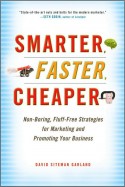 If you’re interested in building, marketing, and promoting your business with agility and grace, not sloth and dullness, get Smarter, Faster, Cheaper. This one-stop guide to the new entrepreneurial landscape—minus the “same old, same old” baggage that drags so many down—gives you real-world examples (as opposed to fluffy theory) from unique, winning innovators, inspiring you to think big and then take successful action.
If you’re interested in building, marketing, and promoting your business with agility and grace, not sloth and dullness, get Smarter, Faster, Cheaper. This one-stop guide to the new entrepreneurial landscape—minus the “same old, same old” baggage that drags so many down—gives you real-world examples (as opposed to fluffy theory) from unique, winning innovators, inspiring you to think big and then take successful action.
In Smarter, Faster, Cheaper, you’ll meet a slew of already legendary new entrepreneurs and promoters, such as “Nametag Guy” Scott Ginsberg, Bravo’s “Millionaire Matchmaker” Patti Stanger, Wine Library founder Gary Vaynerchuk, bestselling author and Squidoo founder Seth Godin, and many, many more. As you learn from their successes and failures, as well as those of author and entrepreneur David Siteman Garland, you’ll discover fresh and exciting approaches to:
- Becoming a trusted resource
- Building your audience and community
- Helping others while helping your business
- Using your content as a handshake
- Creating and growing one-on-one relationships with your customers
- Communicating effectively online and via social media
- Avoiding “selling” by educating, inspiring, and entertaining instead
- And more!
Switch: How to Change Things When Change Is Hard – Dan Heath & Chip Heath
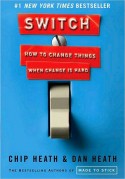 Why is it so hard to make lasting changes in our companies, in our communities, and in our own lives?
Why is it so hard to make lasting changes in our companies, in our communities, and in our own lives?
The primary obstacle is a conflict that’s built into our brains, say Chip and Dan Heath, authors of the critically acclaimed bestseller Made to Stick. Psychologists have discovered that our minds are ruled by two different systems—the rational mind and the emotional mind—that compete for control. The rational mind wants a great beach body; the emotional mind wants that Oreo cookie. The rational mind wants to change something at work; the emotional mind loves the comfort of the existing routine. This tension can doom a change effort—but if it is overcome, change can come quickly.
In Switch, the Heaths show how everyday people—employees and managers, parents and nurses—have united both minds and, as a result, achieved dramatic results:
- The lowly medical interns who managed to defeat an entrenched, decades-old medical practice that was endangering patients.
- The home-organizing guru who developed a simple technique for overcoming the dread of housekeeping.
- The manager who transformed a lackadaisical customer-support team into service zealots byremoving a standard tool of customer service
In a compelling, story-driven narrative, the Heaths bring together decades of counterintuitive research in psychology, sociology, and other fields to shed new light on how we can effect transformative change. Switchshows that successful changes follow a pattern, a pattern you can use to make the changes that matter to you, whether your interest is in changing the world or changing your waistline.
Do More Faster: TechStars Lessons to Accelerate Your Startup – Brad Feld & David Cohen
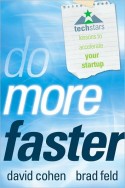 It is a cold, hard fact of business life that most startups fail. Even many of those entrepreneurs who ultimately succeed have stories of personal challenges, unsuccessful companies, and difficulties along the way. The founders of TechStars, a mentorship-driven startup accelerator, have worked with entrepreneurs and companies over the past twenty-five years, and have seen a number of the same issues come up again and again.
It is a cold, hard fact of business life that most startups fail. Even many of those entrepreneurs who ultimately succeed have stories of personal challenges, unsuccessful companies, and difficulties along the way. The founders of TechStars, a mentorship-driven startup accelerator, have worked with entrepreneurs and companies over the past twenty-five years, and have seen a number of the same issues come up again and again.
In Do More Faster, the founders of TechStars identify the key issues that first-time entrepreneurs encounter, and offer proven advice from successful entrepreneurs who have worked with the TechStars program.
The authors organize the most critical issues into seven themes: Idea and Vision, People, Execution, Product, Fundraising, Legal and Structure, and Work and Life Balance. Many of the examples are personal experiences from the entrepreneurs themselves, integrated into a cohesive narrative—while at the same time able to stand on their own. Throughout the book, they debunk numerous myths about startups and reveal some surprising truths. They explain, for instance, that the core of a startup is not always a world-changing and earth-shattering idea—in fact, it is often the case that successful startups started out doing something else. They also underscore the efficiency of execution: great entrepreneurs know how to synthesize data, make a decision about the path they are going down, and execute. And they offer some alternatives to traditional ways of raising money, while stressing that you shouldn’t start with the assumption that you need to raise money.
Mastering the seven themes may not ensure success, but understanding the issues, reading the stories, and getting advice pertaining to these issues will increase your chances dramatically. And if nothing else, you’ll realize that you aren’t alone in facing these challenges.
The Little Big Things: 163 Ways to Pursue Excellence – Tom Peters
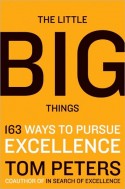 In his latest book, business guru Peters (In Search of Excellence) combines observations he has gleaned from his travels, current news items, conversations, and followers of his blog in a compact guide that aims to help readers realize effective projects, customer contentment, employee engagement, and business profitability. No doubt, Peters is on target as he advises readers to appreciate the angry customer, work on their last impressions, make sure that the restroom is clean, and 160 other ways to guarantee success. Each suggestion contains a rationale, example, and method of implementation, all in two pages apiece.
In his latest book, business guru Peters (In Search of Excellence) combines observations he has gleaned from his travels, current news items, conversations, and followers of his blog in a compact guide that aims to help readers realize effective projects, customer contentment, employee engagement, and business profitability. No doubt, Peters is on target as he advises readers to appreciate the angry customer, work on their last impressions, make sure that the restroom is clean, and 160 other ways to guarantee success. Each suggestion contains a rationale, example, and method of implementation, all in two pages apiece.
VERDICT Those who want to improve their business, whether a boss or an employee, will find great ideas in this compelling and very browsable book.—Deborah Bigelow, Leonia P.L., NJ
UnMarketing: Stop Marketing. Start Engaging – Scott Stratton
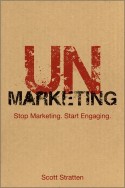 Consider marketing. It’s a vital aspect of running a successful business, but lately its practices have been taking a beating. And why not? Do you like getting cold-called just when you sit down to dinner? Having your mailbox clogged with random offers you immediately toss? Do you listen carefully to the ads that interrupt your favorite TV show? No? If these experiences are “marketing,” you—and your customers—probably prefer whatever’s the complete opposite.
Consider marketing. It’s a vital aspect of running a successful business, but lately its practices have been taking a beating. And why not? Do you like getting cold-called just when you sit down to dinner? Having your mailbox clogged with random offers you immediately toss? Do you listen carefully to the ads that interrupt your favorite TV show? No? If these experiences are “marketing,” you—and your customers—probably prefer whatever’s the complete opposite.
Instead of trying the same tired methods, what if you could have a new kind of conversation with your customers and prospects? If you’re ready to stop marketing and start engaging, then welcome to UnMarketing.
Taking an on-the-ground look at the changing landscape of business-customer relationships, UnMarketing gives you innovative ways out of the old “Push and Pray” rut, which assumes that messages sent out blindly and broadly will magically lead to loyal, long-term clients. Instead, you’ll discover a new, highly responsive “Pull and Stay” approach that brings the right customers to you through listening and engagement, enabling you to build trust and position yourself as their logical choice when they need you.
With a smart take on using social media as a new toolset rather than just a fad, UnMarketing features numerous bite-size chapters you can consult and apply according to your unique business requirements. These chapters are all bursting with practical tips and real-world examples, giving you a sense not just of what works (and what doesn’t) but of how and for whom.
If all business is built on relationships, then, no matter your enterprise, building good relationships is your business. UnMarketing supplies you with a winning approach to stop ineffective marketing and put relationships first—then reap the long-term, high-quality growth that follows!
The Referral Engine: Teaching Your Business to Market Itself – John Jantsch
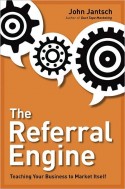 Marketing expert John Jantsch offers practical techniques for harnessing the power of referrals to ensure a steady flow of new customers. Keep those customers happy, and they will refer your business to even more customers. Some of Jantsch’s strategies include:
Marketing expert John Jantsch offers practical techniques for harnessing the power of referrals to ensure a steady flow of new customers. Keep those customers happy, and they will refer your business to even more customers. Some of Jantsch’s strategies include:
-Talk with your customers, not at them. Thanks to social networking sites, companies of any size have the opportunity to engage with their customers on their home turf as never before-but the key is listening.
-The sales team is the most important part of your marketing team. Salespeople are the company’s main link to customers, who are the main source of referrals. Getting them on board with your referral strategy is critical.
-Educate your customers. Referrals are only helpful if they’re given to the right people. Educate your customers about whom they should be talking to.
The secret to generating referrals lies in understanding the “Customer Referral Cycle”-the way customers refer others to your company who, in turn, generate even more referrals. Businesses can ensure a healthy referral cycle by moving customers and prospects along the path of Know, Like, Trust, Try, Buy, Repeat, and Refer. If everyone in an organization keeps this sequence in mind, Jantsch argues, your business will generate referrals like a well-oiled machine.

 RSS Feed
RSS Feed Twitter
Twitter















